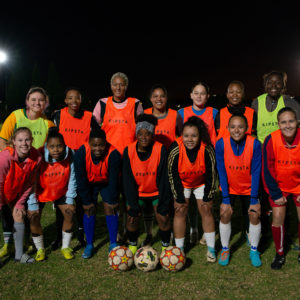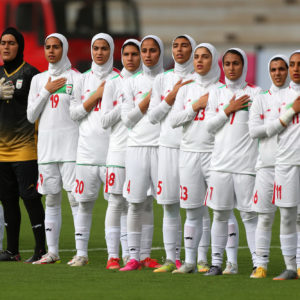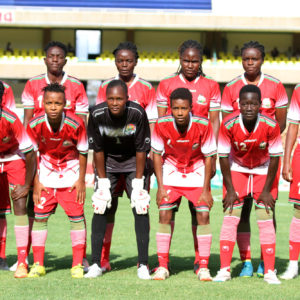Women’s football is gaining traction in Cameroon
The achievements of the national team since 2015 have built support for the Indomitable Lionesses, leading to sponsors, match broadcasts and a commitment to uplift the game in the country.
Author:
7 May 2022

When Gaëlle Enganamouit scored a hat-trick in the 2015 Fifa Women’s World Cup, leading the Indomitable Lionesses to a 6-0 win over Ecuador in Canada, many Cameroonians back home were asleep.
She became the first African player to reach this milestone, and the team’s campaign in the tournament sent a strong message about the trajectory of women’s football in Cameroon and Africa. After that, millions stayed up late into the night to watch their remaining games.
After their round-of-16 exit at the World Cup, the Indomitable Lionesses went all the way to the final of the Women’s Africa Cup of Nations (Afcon) on home soil, where they lost the top prize to Nigeria. It’s not just Enganamouit who shone during that time, CSKA Moscow’s goal-poaching winger Aboudi Onguene, midfielder Raissa Feudjio, Njoya Ajara who flies Cameroon’s flag high across Europe and defender Estelle Johnson of NJ/NY Gotham FC in the United States stood out in this run-up 2020.
Related article:
Then coach Carl Enow Ngachu says their driving force was “discipline, hard work and a sense of sacrifice”. He is widely considered as the father of this golden generation and many still reminisce about the footage of him taking the players to training in taxis during their very challenging preparation for the 2016 Olympic Games qualifiers.
He adds that through trying times he reminded the players “you are fighting for others, you are the sacrificial lamb. If you want women’s football to be known not only in Cameroon, but throughout the continent, you have to create history and what you do, people will always keep in mind, even after 50 years.”
Today Ngachu heads the National Football Academy, a state-led hub for nurturing young, talented male and female footballers scouted from across the country.
Exposure and funding
The foundation that the Ngachu-led generation laid created fertile ground for the current crop of emerging talent. Among the names to watch out for is Flora Kameni, the 20-year-old who scored a brace in the Lionesses’ record 8-0 win against The Gambia to qualify for the 2022 Women’s Afcon, which is scheduled to be played in Morocco from 2 to 23 July. The agile and prolific centreforward surged from Louves Minproff to the Under-17 and Under-20 teams prior to her senior national team debut.
Balancing football and studies is sensational 18-year-old forward Tabe Brenda Ebika, who had to halt her training in camp with the Under-20 national team last year to write her advanced level exams, which she passed. Also among this new generation of players is Eliane Aime Bibout, 23, the top goalscorer of the women’s league with 18 goals in the 2020-2021 season, and 19-year-old Michaely Bihina of Eclair FC Filles, who was awarded the Goalkeeper of the Season award.
Related article:
“It is only after the ladies’ emergence [between 2015 and 2020] that many people started to notice that it is not only the men’s team that exists – and that’s where some of our parents started encouraging us, I felt very inspired,” said Ajebe Raissa, who is trying to make a name for herself in Cameroonian football.
This success also led to significant partnerships between Cameroon’s football governing body Fecafoot and brewery Guinness, as well as with the state broadcaster, which now airs women’s league matches.
But there is still work to be done to grow the league.
A way to go
The championship, which launched in 1990, has been played in the shadow of the men’s football league. Yet the latter has had its struggles too, lacking in professionalism when it comes to the running of the league and financial issues.
A 2021 survey on the living and working conditions of footballers in Cameroon, conducted by the Geremi Njitap-led National Union of Cameroonian Footballers, revealed that only 5% of women in the Guinness Super League have a copy of their contract. And among those who have signed a contract, only a fortunate few receive their full bonuses.
Related article:
More investors would also allow for organised women’s football clubs in regions where there are none. Not having a club in their region is the reason many young girls are forced to move away from home if they want to play football. Raissa, who moved from the South West to play in the East says: “There is no female football club in the South West region and that goes to show that there is very little interest. Most of the players you have in the South West, you see them in different regions looking for greener pastures.”
Fecafoot president Samuel Eto’o said during his pre-election campaign that he was committed to uplifting women’s football and empowering the next generation of Indomitable Lionesses. One major change under him is that the new season that started on 16 April sees players paid 100 000 Central African CFA francs (just over R2 500) a month, with half coming from Fecafoot and the other half from the sponsors.
Game time required
Getting more game time for the women’s national team is another struggle. Like other African countries, Cameroon only plays when there are qualifiers and tournaments, and the standard of the domestic league isn’t high enough to prepare players for the demands of a World Cup.
This hasn’t stopped coach Gabriel Zabo from saying that their goal this year is to win the Afcon. Cameroon have been drawn to play Zambia, Tunisia and Togo in group B.
Related article:
Enganamouit bowed out of the game after the 2019 World Cup with a persistent ligament injury. Her exploits on the pitch, including being named the 2015 CAF Women Footballer of the Year, earned her multiple brand ambassador deals and she’s now paving the way for the next generation with her football academy in Yaoundé. Rails Football Academy adds to the increasing number of women’s teams based in the country’s major cities.
Onguene was able to renovate her family home with the money she made during her playing career. And she has recently signed a contract extension that ensures a post-retirement career on the staff of CSKA Moscow. This generation’s exploits inspired a generation of women footballers in Cameroon, and with an exciting bunch coming through there is the belief that they can do one better than the group who inspired them by going all the way in the Afcon.




